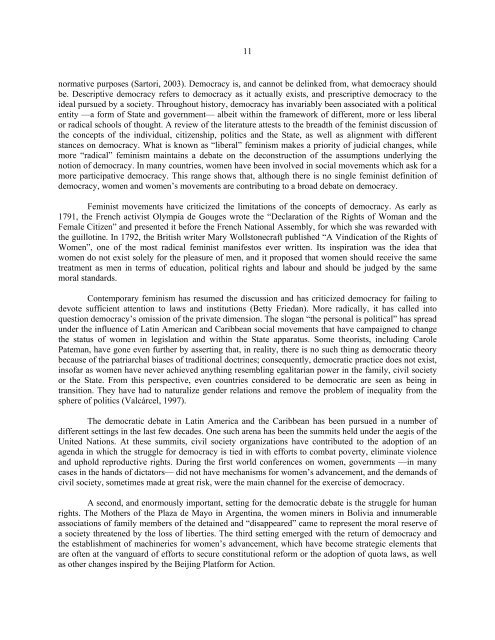Women in Latin America and the Caribbean - Cepal
Women in Latin America and the Caribbean - Cepal
Women in Latin America and the Caribbean - Cepal
Create successful ePaper yourself
Turn your PDF publications into a flip-book with our unique Google optimized e-Paper software.
11<br />
normative purposes (Sartori, 2003). Democracy is, <strong>and</strong> cannot be del<strong>in</strong>ked from, what democracy should<br />
be. Descriptive democracy refers to democracy as it actually exists, <strong>and</strong> prescriptive democracy to <strong>the</strong><br />
ideal pursued by a society. Throughout history, democracy has <strong>in</strong>variably been associated with a political<br />
entity —a form of State <strong>and</strong> government— albeit with<strong>in</strong> <strong>the</strong> framework of different, more or less liberal<br />
or radical schools of thought. A review of <strong>the</strong> literature attests to <strong>the</strong> breadth of <strong>the</strong> fem<strong>in</strong>ist discussion of<br />
<strong>the</strong> concepts of <strong>the</strong> <strong>in</strong>dividual, citizenship, politics <strong>and</strong> <strong>the</strong> State, as well as alignment with different<br />
stances on democracy. What is known as “liberal” fem<strong>in</strong>ism makes a priority of judicial changes, while<br />
more “radical” fem<strong>in</strong>ism ma<strong>in</strong>ta<strong>in</strong>s a debate on <strong>the</strong> deconstruction of <strong>the</strong> assumptions underly<strong>in</strong>g <strong>the</strong><br />
notion of democracy. In many countries, women have been <strong>in</strong>volved <strong>in</strong> social movements which ask for a<br />
more participative democracy. This range shows that, although <strong>the</strong>re is no s<strong>in</strong>gle fem<strong>in</strong>ist def<strong>in</strong>ition of<br />
democracy, women <strong>and</strong> women’s movements are contribut<strong>in</strong>g to a broad debate on democracy.<br />
Fem<strong>in</strong>ist movements have criticized <strong>the</strong> limitations of <strong>the</strong> concepts of democracy. As early as<br />
1791, <strong>the</strong> French activist Olympia de Gouges wrote <strong>the</strong> “Declaration of <strong>the</strong> Rights of Woman <strong>and</strong> <strong>the</strong><br />
Female Citizen” <strong>and</strong> presented it before <strong>the</strong> French National Assembly, for which she was rewarded with<br />
<strong>the</strong> guillot<strong>in</strong>e. In 1792, <strong>the</strong> British writer Mary Wollstonecraft published “A V<strong>in</strong>dication of <strong>the</strong> Rights of<br />
<strong>Women</strong>”, one of <strong>the</strong> most radical fem<strong>in</strong>ist manifestos ever written. Its <strong>in</strong>spiration was <strong>the</strong> idea that<br />
women do not exist solely for <strong>the</strong> pleasure of men, <strong>and</strong> it proposed that women should receive <strong>the</strong> same<br />
treatment as men <strong>in</strong> terms of education, political rights <strong>and</strong> labour <strong>and</strong> should be judged by <strong>the</strong> same<br />
moral st<strong>and</strong>ards.<br />
Contemporary fem<strong>in</strong>ism has resumed <strong>the</strong> discussion <strong>and</strong> has criticized democracy for fail<strong>in</strong>g to<br />
devote sufficient attention to laws <strong>and</strong> <strong>in</strong>stitutions (Betty Friedan). More radically, it has called <strong>in</strong>to<br />
question democracy’s omission of <strong>the</strong> private dimension. The slogan “<strong>the</strong> personal is political” has spread<br />
under <strong>the</strong> <strong>in</strong>fluence of Lat<strong>in</strong> <strong>America</strong>n <strong>and</strong> <strong>Caribbean</strong> social movements that have campaigned to change<br />
<strong>the</strong> status of women <strong>in</strong> legislation <strong>and</strong> with<strong>in</strong> <strong>the</strong> State apparatus. Some <strong>the</strong>orists, <strong>in</strong>clud<strong>in</strong>g Carole<br />
Pateman, have gone even fur<strong>the</strong>r by assert<strong>in</strong>g that, <strong>in</strong> reality, <strong>the</strong>re is no such th<strong>in</strong>g as democratic <strong>the</strong>ory<br />
because of <strong>the</strong> patriarchal biases of traditional doctr<strong>in</strong>es; consequently, democratic practice does not exist,<br />
<strong>in</strong>sofar as women have never achieved anyth<strong>in</strong>g resembl<strong>in</strong>g egalitarian power <strong>in</strong> <strong>the</strong> family, civil society<br />
or <strong>the</strong> State. From this perspective, even countries considered to be democratic are seen as be<strong>in</strong>g <strong>in</strong><br />
transition. They have had to naturalize gender relations <strong>and</strong> remove <strong>the</strong> problem of <strong>in</strong>equality from <strong>the</strong><br />
sphere of politics (Valcárcel, 1997).<br />
The democratic debate <strong>in</strong> Lat<strong>in</strong> <strong>America</strong> <strong>and</strong> <strong>the</strong> <strong>Caribbean</strong> has been pursued <strong>in</strong> a number of<br />
different sett<strong>in</strong>gs <strong>in</strong> <strong>the</strong> last few decades. One such arena has been <strong>the</strong> summits held under <strong>the</strong> aegis of <strong>the</strong><br />
United Nations. At <strong>the</strong>se summits, civil society organizations have contributed to <strong>the</strong> adoption of an<br />
agenda <strong>in</strong> which <strong>the</strong> struggle for democracy is tied <strong>in</strong> with efforts to combat poverty, elim<strong>in</strong>ate violence<br />
<strong>and</strong> uphold reproductive rights. Dur<strong>in</strong>g <strong>the</strong> first world conferences on women, governments —<strong>in</strong> many<br />
cases <strong>in</strong> <strong>the</strong> h<strong>and</strong>s of dictators— did not have mechanisms for women’s advancement, <strong>and</strong> <strong>the</strong> dem<strong>and</strong>s of<br />
civil society, sometimes made at great risk, were <strong>the</strong> ma<strong>in</strong> channel for <strong>the</strong> exercise of democracy.<br />
A second, <strong>and</strong> enormously important, sett<strong>in</strong>g for <strong>the</strong> democratic debate is <strong>the</strong> struggle for human<br />
rights. The Mo<strong>the</strong>rs of <strong>the</strong> Plaza de Mayo <strong>in</strong> Argent<strong>in</strong>a, <strong>the</strong> women m<strong>in</strong>ers <strong>in</strong> Bolivia <strong>and</strong> <strong>in</strong>numerable<br />
associations of family members of <strong>the</strong> deta<strong>in</strong>ed <strong>and</strong> “disappeared” came to represent <strong>the</strong> moral reserve of<br />
a society threatened by <strong>the</strong> loss of liberties. The third sett<strong>in</strong>g emerged with <strong>the</strong> return of democracy <strong>and</strong><br />
<strong>the</strong> establishment of mach<strong>in</strong>eries for women’s advancement, which have become strategic elements that<br />
are often at <strong>the</strong> vanguard of efforts to secure constitutional reform or <strong>the</strong> adoption of quota laws, as well<br />
as o<strong>the</strong>r changes <strong>in</strong>spired by <strong>the</strong> Beij<strong>in</strong>g Platform for Action.











